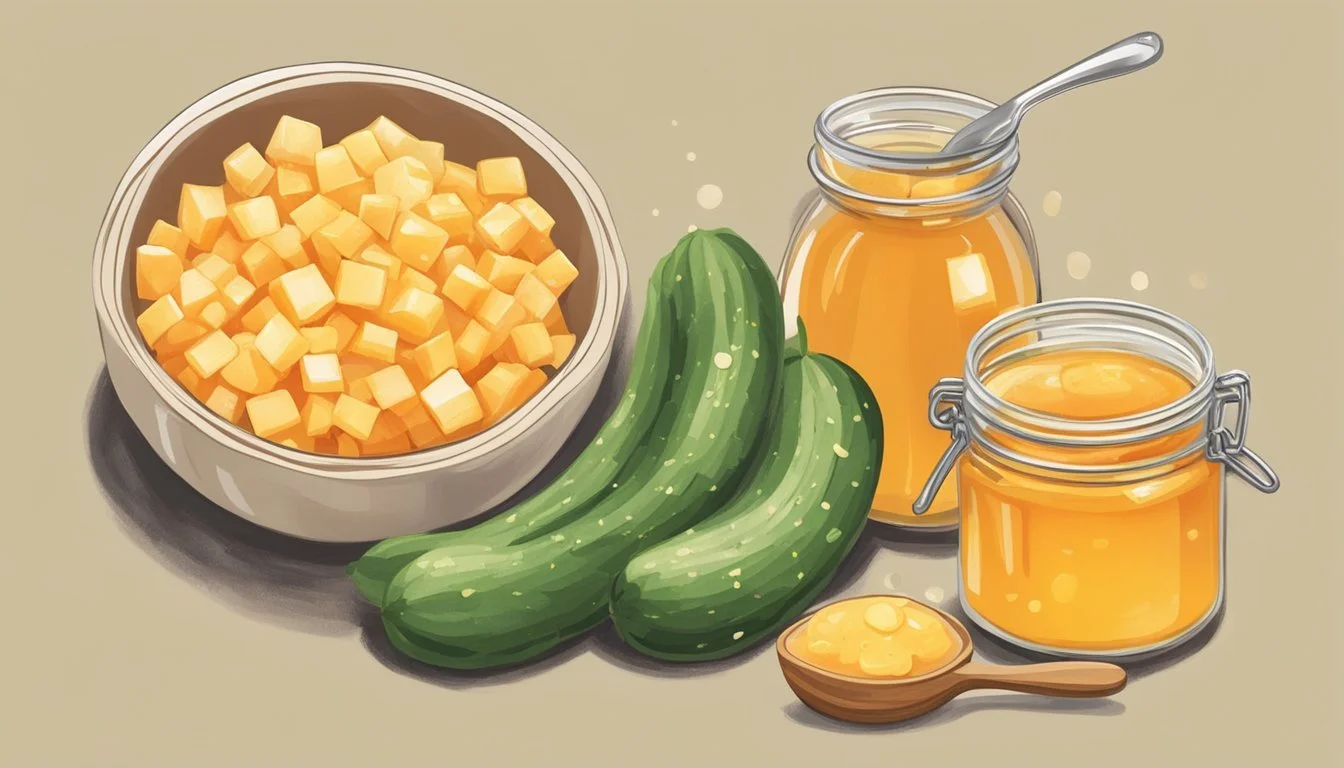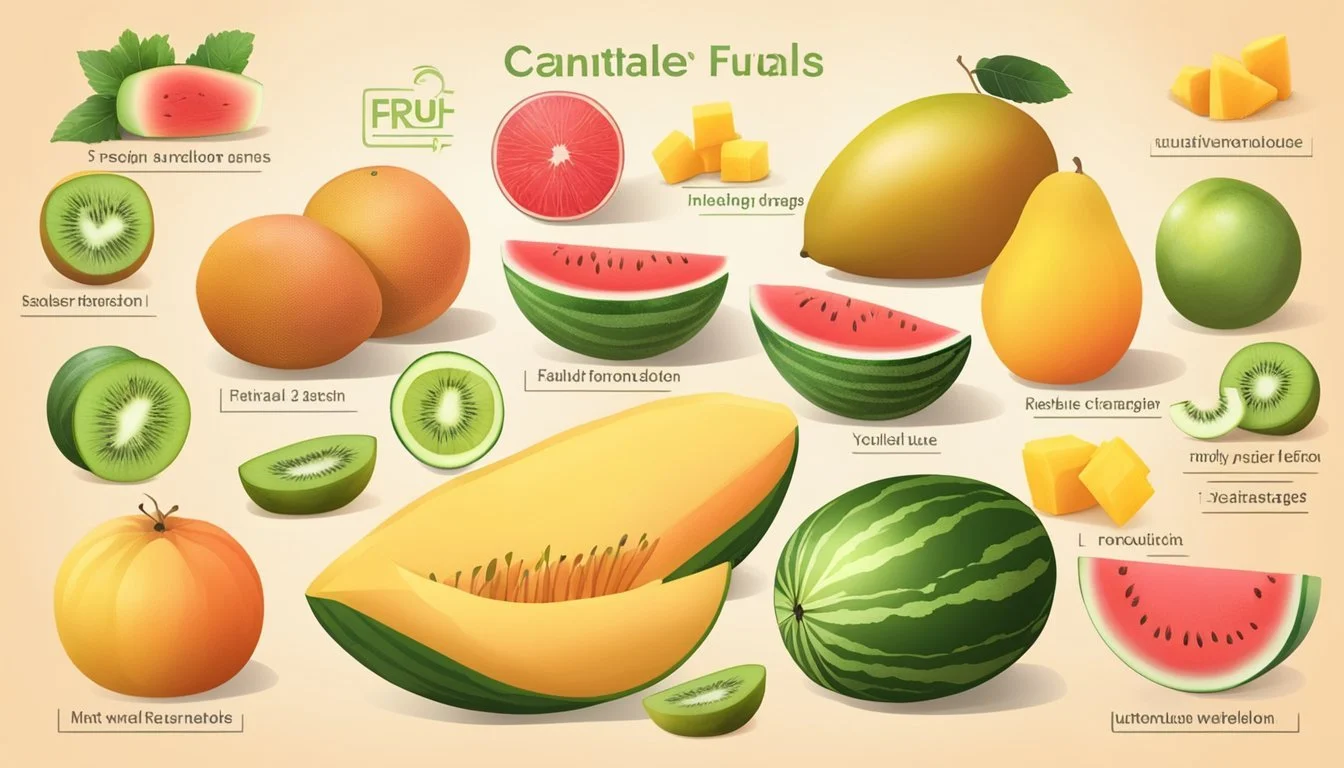Honeydew Substitutes
Top Alternatives for Your Recipes
Finding the perfect honeydew substitute can be essential, especially when this beloved melon isn't in season. For those looking for an equally sweet and juicy alternative, watermelon stands out as a top choice. High in vitamins A and C, and a great source of antioxidants, watermelon serves as a refreshing and nutritious summer snack. This fruit not only matches honeydew’s sweetness but also adds a vibrant burst of color to any dish.
Other excellent honeydew substitutes include cantaloupe and pear. Cantaloupe offers a similarly sweet flavor profile and can easily be used in salads, smoothies, or as a delightful snack. Pears, on the other hand, bring a unique texture and mellow sweetness that pairs well with cheeses and desserts.
For those in search of less common alternatives, consider trying papaya or even jicama. Papaya's tropical sweetness and creamy texture can mimic honeydew in fruit salads and salsas. Jicama, though less sweet, provides a crispy, refreshing bite that can be a surprising yet delicious change in recipes calling for honeydew.
Understanding Honeydew
Honeydew melon is a type of melon known for its smooth, green skin and sweet, pale green flesh. It is often enjoyed as a refreshing, healthy snack.
Nutritional Info
Honeydew is rich in vitamins C and B6, along with potassium and fiber. These nutrients offer several health benefits, such as boosting the immune system and supporting heart health.
Sweetness and Flavor
The sweetness of honeydew makes it an excellent addition to fruit salads, smoothies, or desserts. Its mild, slightly floral flavor pairs well with a variety of other fruits and ingredients, enhancing the overall taste experience.
High in Antioxidants
Honeydew contains antioxidants, which help protect the body from damage caused by free radicals. Antioxidants are important for maintaining healthy cells and reducing inflammation.
Rich in Nutrients
In addition to vitamins and potassium, honeydew provides folate, which is vital for cell growth and regeneration. This makes it an ideal fruit for pregnant women and those looking to improve their overall health.
Comparison with Other Fruits
When considering honey substitutes or alternatives, honeydew's distinct flavor and nutritional profile can be compared to other melons, such as cantaloupe or watermelon. Each offers unique benefits and can be used interchangeably in various recipes.
Healthy Snack
Honeydew is a popular choice for those seeking a low-calorie, nutrient-rich snack. Due to its high water content, it is hydrating and helps keep the body cool, especially during hot weather.
The Importance of Substitutes
Substituting honeydew can be crucial for those with dietary restrictions and allergies, for vegans seeking plant-based options, and due to the seasonal availability of honeydew melons.
Dietary Restrictions and Allergies
Individuals with specific dietary restrictions or allergies often need substitutes. Some may have sensitivities or intolerances to certain compounds present in honeydew melons, making alternatives essential.
For instance, watermelon is an ideal replacement for honeydew. It is rich in vitamins A and C and offers lycopene, an antioxidant, without causing allergies. Furthermore, those managing sugar intake might prefer low-sugar fruits, aligning better with their dietary needs.
Vegan Alternatives
Vegans require alternatives to honeydew due to lifestyle choices. Honeydew, though plant-based, isn't always available year-round or in all regions. Substitutes such as watermelon align with vegan principles, offering a sweet, juicy alternative.
Watermelon is not only vegan-friendly but also packed with nutrients, providing a healthful snack option. Other possibilities include cantaloupe or even tropical fruits like papaya, ensuring variety and nutritional value.
Availability and Seasonality
Honeydew melons are often not available year-round, making substitutes necessary. Seasonal changes affect the availability, price, and quality of honeydew, creating a need for readily available alternatives.
Fruits like watermelon or cantaloupe are more consistently available and can stand in for honeydew. These substitutes ensure that the taste and nutritional benefits are accessible even when honeydew isn’t in season. Using these alternatives can also help maintain a balanced diet throughout the year.
Common Honeydew Substitutes in Cooking
When honeydew melon is unavailable, there are various substitutes that can effectively replace its sweet, juicy flavor and texture in recipes. From liquid sweeteners to sugar-based alternatives and fruit purees, these substitutes can enhance your dishes without compromising on taste.
Liquid Sweeteners
Maple Syrup: Maple syrup is a sweet, sticky liquid made from the sap of maple trees. It's a natural sweetener that works well in dressings, sauces, and marinades. Maple syrup provides a rich flavor with hints of caramel that can complement many dishes. Use it in a 1:1 ratio to replace honeydew in recipes that benefit from a liquid sweetener.
Bee-free Honey: This vegan honey substitute is made from fruits like apples, pears, or grapes. It mimics honey in taste and texture, making it a versatile option. Use it in smoothies, fruit salads, and desserts to achieve a similar sweetness and consistency as honeydew melon.
Sugar-based Substitutes
Brown Sugar: Brown sugar, whether light or dark, adds a rich sweetness and a subtle caramel flavor to dishes. It’s ideal for baking and cooking. When using brown sugar as a substitute for honeydew, adjust the liquid content in your recipe to compensate for its dry form.
Sorghum Syrup: Derived from the juice of the sorghum plant, this syrup has a deep, molasses-like flavor with caramel undertones. It’s suitable for baking and for use in sauces and marinades. Sorghum syrup can be used in similar proportions to honeydew to maintain the desired level of sweetness.
Fruit Purees
Watermelon Puree: Watermelon is a juicy fruit with a refreshing sweetness, making it an excellent substitute for honeydew. Puree fresh watermelon to use in smoothies, sorbets, or as a base for fruit sauces. It provides similar hydration and sweetness, though its flavor is slightly different.
Cantaloupe Puree: Cantaloupe is another melon with a sweet, juicy profile. When pureed, it can replace honeydew melon in various recipes, including desserts and fruit salads. Its slightly firmer texture and distinctive flavor offer a delicious alternative while maintaining the refreshing quality of honeydew.
These substitutes ensure that your recipes can achieve the desired taste and texture without compromise, making your culinary creations as delightful as ever.
Favorite Honeydew Substitutes in Baking
In baking, honeydew can be substituted by various ingredients to provide the necessary sweetness and texture. These substitutes range from syrups and liquid sweeteners to granulated sugars and fruit-based options.
Syrups and Liquid Sweeteners
Agave Nectar
Agave nectar, produced from the agave plant, is a versatile honeydew substitute. It is sweet and thick, similar to honeydew, and is vegan-friendly. Agave nectar works well in cakes, cookies, and sweet bread, offering a mild, sweet flavor.
Maple Syrup
Maple syrup is another excellent choice, known for its distinctive flavor and sticky consistency. It can replace honeydew in most baked goods, providing a sweet, rich taste. This syrup enhances the flavor profile of muffins, pancakes, and granola bars.
Bee-Free Honey
Bee-free honey, derived from fruits like apples or pears, mimics the texture and sweetness of honeydew but is entirely plant-based. It is useful for vegan recipes and can be used in various baking applications such as pies and fruit tarts.
Granulated and Powdered Sugars
Brown Sugar
Brown sugar, either light or dark, serves as a reliable honeydew substitute. It introduces a rich sweetness and a slight caramel flavor to recipes. As it is a dry ingredient, it may make the end product slightly drier but is ideal for cookies and spice cakes.
White Sugar and Maple Syrup Mix
A combination of ½ cup white sugar and ½ cup maple syrup for every 1 cup of honeydew can also be used. This mixture keeps the batter from becoming too loose and works well in cakes and muffins.
Coconut Sugar
Coconut sugar can replace honeydew, bringing a unique, subtly caramelized flavor. It is less processed and retains more nutrients. This sugar is excellent for recipes requiring a more complex sweetness, suitable for brownies and quick bread.
Fruit-Based Options
Applesauce
Applesauce is a frequently used fruit-based substitute. It provides moisture along with natural sweetness, making it perfect for reducing added sugars. It is great for recipes like muffins, cakes, and pancakes.
Banana Puree
Banana puree can replace honeydew, contributing both sweetness and moisture. It works well in baked goods, particularly in recipes where a dense texture is acceptable, such as banana bread and muffins.
Pumpkin Puree
Pumpkin puree, while more seasonal, provides a unique flavor and moist consistency. It is especially useful in autumnal recipes, such as pumpkin bread, cookies, and spiced cakes, adding a natural sweetness and rich texture.
Specific Honeydew Replacement Recommendations
When seeking substitutes for honeydew, it is important to explore various sweeteners and syrups that can provide similar flavors and textures. The options outlined here offer a range of culinary possibilities, each with unique characteristics that make them useful in different recipes.
Maple Syrup and Varieties
Maple syrup, derived from the sap of maple trees, comes in several grades. Grade A is light and mild in flavor, while Grade B is darker and more robust. It's ideal for drizzling over fruit salads or integrating into smoothies.
Golden syrup, another variety, provides a caramel-like taste and can be used as a honeydew substitute in baking. Agave nectar, though not a maple product, offers a similar sweetness that blends well in cold dishes.
Molasses and Its Types
Molasses, a by-product of sugar refining, varies from light to dark. Light molasses has a milder flavor suited for fruit-based recipes. Blackstrap molasses, on the other hand, is less sweet but rich in minerals, making it a nutritious addition to smoothies.
Sorghum syrup is another type with a sweet and tangy profile, perfect for complementing the natural flavors of other fruits. Its darker notes can enhance the depth of fruit salads.
Unique Syrups and Their Uses
Barley malt syrup, a thick, malt-flavored sweetener, can replace honeydew in more savory applications. Coconut nectar, with its low glycemic index, works well as a sweetener in fruit sauces and dressings.
Yacon syrup, extracted from yacon root, has a mild flavor and prebiotic properties, making it a healthy alternative for sweet dishes. Date paste is another natural sweetener that pairs well with fresh fruits and can be used in both raw and baked recipes.
Granulated Sweeteners
Brown sugar combines molasses and granulated sugar, offering a rich, caramel flavor that can mimic the sweetness of honeydew in desserts. White sugar is more neutral and versatile for various recipes.
Coconut sugar has a slight caramel taste, making it suitable for fruit salads and baked goods. Liquid stevia, a non-caloric sweetener, provides concentrated sweetness without altering the texture of the dish. Granulated sugar remains the simplest option due to its purity and easy mixing in both liquid and dry preparations.
Honeydew Substitutes in Sauces and Marinades
Honeydew, with its sweet and mild flavor, can be effectively replaced in sauces and marinades using a variety of ingredients. Depending on the desired taste profile, acidity, sweetness, or sugar content, different substitutes can be used.
Acidic Components
Substitutes like lemon juice and apple cider vinegar offer bright, tangy notes that can complement and enhance the flavors of marinades and sauces. Lemon juice, with its high acidity, is excellent for tenderizing meat and adding a fresh, zesty element to salad dressings and glazes.
Apple cider vinegar adds a more robust, slightly fruity tang, which can be perfect for creating balance in rich marinades. It works well in combination with sweeteners to mimic the honeydew's subtle sweetness while still providing a necessary acidic counterpoint.
Sweet Syrups and Nectars
For a direct sugar replacement, simple syrup is an effective choice. Simple syrup, made from equal parts sugar and water, dissolves easily, making it perfect for adding straightforward sweetness to sauces and marinades without altering the texture.
Maple syrup and agave nectar offer richer, complex flavors. Maple syrup's woodsy undertones work well in marinades for meats such as pork or chicken, while agave nectar, with its neutral sweetness, can be used broadly. Agave is also an excellent vegan option, closely mimicking honeydew’s sweetness and consistency in various applications.
Sugar-based Alternatives
Granulated sugar and brown sugar can serve as straightforward honeydew substitutes. Brown sugar, with its molasses content, adds depth and a slight caramel note to marinades and glazes. It's particularly good for barbecue sauces and heavier glazes.
Jaggery, an unrefined sugar, brings a richer, more earthy sweetness. This sugar alternative can be used in combination with acidic components like apple cider vinegar or lemon juice to create balanced marinades that enhance both meats and vegetables.
Using these alternatives ensures that the desired sweet and acidic balance is achieved, maintaining the integrity and intended flavor profile of the dish.
Nutritional Comparison of Substitutes
Watermelon
Watermelon is a popular substitute for honeydew melon. It contains vitamins A and C and is high in antioxidants like lycopene. One cup of watermelon has roughly 46 calories, making it a low-calorie option.
Cantaloupe
Cantaloupe is another excellent substitute. It also provides a good amount of vitamins A and C. Cantaloupe is slightly denser in calories, with about 54 calories per cup.
Greek Yogurt (Plain Nonfat or Low-fat)
Nonfat or low-fat plain Greek yogurt can be substituted in various recipes. It's rich in protein and calcium, providing a different nutritional profile compared to melons. It contains approximately 59 calories per 100g.
Applesauce (Pureed Fruit)
Pureed fruit like applesauce can be used in baking as a substitute for sweeteners or fats. While not directly a honeydew replacement, it still offers a range of vitamins like vitamin C and fiber. One cup has about 102 calories.
Substitute Calories (per cup) Key Nutrients Antioxidants Watermelon 46 Vitamins A and C Lycopene Cantaloupe 54 Vitamins A and C Beta-carotene Greek Yogurt 59 (per 100g) Protein, Calcium Not significant Applesauce 102 Vitamin C, Fiber Not significant
Substituting honeydew with these alternatives can still provide necessary vitamins and maintain a balanced diet.
Creative Uses for Honeydew Substitutes
Honeydew substitutes can be used in various innovative ways, from unique pairings in dishes to making sweet treats and even fermenting them for drinks. Utilizing substitutes like watermelon, pears, and apples can bring new flavors and textures to your culinary creations.
Non-traditional Pairings
Pairing honeydew substitutes with unexpected ingredients can elevate your dishes. Watermelon combined with feta cheese creates a refreshing and savory-sweet contrast. Apples and pears can be paired with blue cheese and a drizzle of dandelion syrup for a sophisticated appetizer.
Example Recipe: Watermelon and Feta Salad
2 cups diced watermelon
1/2 cup crumbled feta cheese
Fresh mint leaves
A dash of balsamic reduction
Pears and banana slices sprinkled with a bit of yacon root syrup can be served as a light and healthy dessert.
Fermenting with Substitutes
Fermenting honeydew substitutes can create unique beverages and enhance their flavors. Watermelon can be used to make a refreshing and slightly tart watermelon wine. Fermenting pears and apples creates delicious cider that can be spiced for a warmer note.
Watermelon Wine Recipe:
4 cups watermelon juice
1 cup sugar
1 tsp yeast
Combine ingredients in a sterile container and let ferment for about two weeks. Strain and bottle for a delightful drink.
Apple and pear ferment can also be utilized to make sparkling drinks, perfect for a refreshing summer beverage.
Homemade Sweet Treats
Substitutes like maple syrup and coconut syrup can replace honey in various sweet treats. Pears poached in coconut syrup bring a tropical sweetness, while apple slices can be baked with a sprinkle of brown sugar for a caramel-like flavor.
Pears in Coconut Syrup Recipe:
4 ripe pears, peeled and halved
1/2 cup coconut syrup
1 cup water
Simmer the pears in the syrup-water mixture until tender. Serve chilled with a garnish of mint.
For a unique twist, try making banana pancakes with a drizzle of dandelion syrup, or substitute honey with yacon root syrup in your favorite baked goods for a rich and healthful sweetness.
Each of these creative uses makes honeydew substitutes versatile additions to your kitchen, adding exciting flavors and new dimensions to your dishes.










